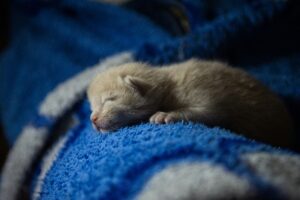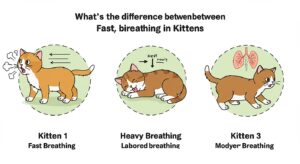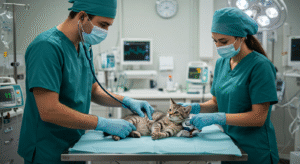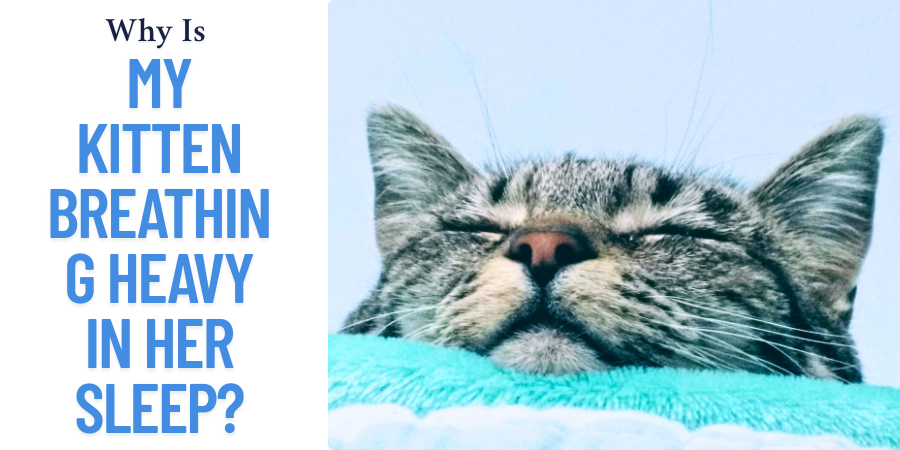As a pet parent, I’ve spent countless nights watching my tiny furball curled up and sleeping, only to notice her chest rise and fall rapidly, a sight that can feel both confusing and alarming. While rapid breathing during sleep may seem like a concern, it’s often perfectly normal, especially in a growing kitten. Still, it’s important to dive into the patterns and underlying causes because difficulty breathing is always found at the top of lists of health emergencies in cats.
With expert insights from Lemonade’s favorite vet, Dr. Stephanie Liff, I learned that although heavy breathing can be a sign of something serious, kittens are known for hiding when they’re sick or injured, so by the time it becomes noticeable, it might already be nearing a crisis. Understanding these things early can make all the difference. In this article, I have covered in detail why is my kitten breathing heavy in her sleep
Contents
- 1 Is It Normal for My Kitten to Breathe Fast While Sleeping?
- 2 What’s the Difference Between Heavy, Fast, and Labored Breathing?
- 3 Causes of Heavy Breathing in Cats
- 4 What to Do at Home Before Rushing to the Vet
- 5 Vet Diagnosis: What to Expect
- 6 Treatments for Heavy Breathing in Cats
- 7 FAQs about cat heavy breathing
Is It Normal for My Kitten to Breathe Fast While Sleeping?
When I first noticed my kitten breathing faster than usual while sleeping, I wasn’t sure if it was normal or something to worry about. After speaking with Dr. Liff, I learned that kittens naturally have a higher respiratory rate compared to adult cats. It’s common for them to breathe faster, especially when resting, due to their growing bodies, metabolic rate, and heart rate all working hard to develop. A healthy rate can range from 20 to 30 breaths per minute, and as long as your kitty is not showing signs of labored or irregular breathing, there’s usually no cause for alarm.

Still, I made a habit of taking a quiet moment and counting every breath, watching the chest gently rise and fall. A normal breath should oxygenate the lungs, send oxygenated blood through the body, and support the vital organs in doing their essential jobs. If the breathing looks shallow, unusually rapid, or becomes tachypnea, it might be an indication of insufficient oxygen. That’s when investigating further to ensure your cat stays healthy becomes important.
What’s the Difference Between Heavy, Fast, and Labored Breathing?
- Heavy Breathing: The first time I noticed heavy breathing in my cat, her chest was moving more than usual while she was simply resting. It wasn’t panting, but her breathing had become deep and noisy, almost raspy, with each breath sounding like a soft growl. Overheating, stress, or respiratory problems like feline asthma, pneumonia, or lung disease can all contribute to this kind of abnormal breathing, especially if the lungs, trachea, or nasal passages are involved.
- Fast Breathing: When breathing turns fast, it’s often linked to oxygen and carbon dioxide exchange being disrupted. My kitten once experienced this after exercise, but it quickly calmed—a good sign. However, rapid rising and falling of the stomach, oxygen deficiency, and signs like blue-colored gums, nasal congestion, or a rising breathing rate can also point to health problems like heart disease, metabolic conditions, or uncontrolled diabetes. A gurgly, shallow breathing sound or increased body temperature could be your first clue.
- Labored Breathing: I’ve seen labored or difficulty breathing show up with signs like open-mouth breathing, abdominal breathing, and even muscle movement along the belly. When the airway is narrowed or obstructed due to respiratory infections, nasal discharge, or airway blockage, the body works harder to breathe. Symptoms like fatigue, gagging, lethargy, coughing, or inhale/exhale imbalance often appear. If your kitten breathes this way during rest, even a deep sigh shouldn’t be dismissed.

Even if your kitten seems calm, subtle signs like changes in breathing pattern, unusual breathing sounds, or deviation from normal breathing shouldn’t be overlooked. The pharynx or small airways may be involved, especially when essential functions like delivering oxygen to vital organs are at risk. A kitten’s body is still developing, and even the smallest health issue can grow quickly if not caught early.
As someone who has cared for fragile kittens, I’ve learned that every symptom matters. Whether it’s a vocal sound during sleep or strange pauses in breathing, being observant gives your kitten the best chance at staying healthy and thriving.
Causes of Heavy Breathing in Cats
I once cared for a kitten who suddenly developed labored breathing, and it turned out to be asthma—something I didn’t expect in such a young cat. Respiratory infections caused by viruses, bacteria, fungi, or other microorganisms can easily disrupt normal breathing and progress into pneumonia or tracheobronchitis. Other culprits include chronic bronchitis, cancer, or foreign objects lodged in the airways, all of which interfere with the respiratory system. Even parasites like heartworms, transmitted by a mosquito carrying Dirofilaria immitis, can lead to heartworm disease, impacting blood circulation and placing pressure on the lungs.
Heavy breathing may also be triggered by fluid buildup, gas, pus, or chyle—a fatty liquid—within the chest cavity, making it harder for your cat to breathe. I’ve seen cases where anemia, injuries, pain, or neurologic dysfunction shift abdominal organs and compromise lung space. Stress, trauma, and exposure to toxins, drugs, or poisons like acetaminophen (Tylenol) can harm red blood cells or interfere with oxygen delivery. Bleeding, issues with blood clotting, or allergic reactions can also result in sudden and serious breathing problems. Furthermore, if, as a pet parent, you are concerned about your cat’s vision, we have covered all about it in our recent article Feline Night Vision Explained: Can Cats See in the Dark?
I once met a cat who had a chronic cough that lasted more than eight weeks, and at first, it was dismissed as just a hairball issue. But it turned out to be an early symptom of a serious issue in her respiratory system. Shortness of breath after light exertion or while exercising isn’t normal and could be a warning sign. Even labored breathing or difficult breathing when trying to breathe normally is enough to raise concern. That’s when I learned that the body sometimes signals deeper problems through these subtle changes.

Another cat I helped had chronic mucus production—that sticky mucus, sputum, or phlegm filling the airways, caused by infections or airborne irritants, and it later progressed into lung disease. Wheezing and noisy breathing showed that something was blocking or making the lungs too narrow. One of the most alarming signs I’ve seen is coughing up blood, which often points to damage in the upper respiratory tract and a severe health problem. Persistent chronic chest pain, or unexplained pain when you breathe in, can be equally dangerous and should never be overlooked.
What to Do at Home Before Rushing to the Vet
When my cat started breathing consistently fast while sleeping, I didn’t panic—but I knew not to wait either. Before contacting a veterinarian, I quietly observed her breathing rate, checked for worse symptoms, and prepared for what the next steps might be. If your pet’s condition seems to be escalating, this could be a medical emergency. In such cases, your vet can assess the medical situation over a call and likely recommend you bring your pet to a hospital like AnimERge immediately.
It’s vital to remember that only trained veterinarians can truly recognize the causes and administer effective treatment. Trying to treat a symptom without understanding the cause might do more harm than good. The internet, including sites like Quora, lacks the necessary training, and even skilled vets won’t diagnose an animal without examining it in person. If your cat shows signs of abnormal breathing, they may be struggling and in panic, needing a doctor’s care. No matter the delay—whether justifiable or unavoidable—please seek a veterinarian’s attention ASAP. If there’s an interim, call any shelter, clinic, or professional advice line that will listen and help.
Vet Diagnosis: What to Expect
When I noticed my kitten experiencing rapid breathing, I realized it wasn’t just a fleeting concern. Subtle symptoms can sometimes point to serious health conditions, and that’s why a timely vet visit matters. A veterinarian is trained to uncover the underlying problem using specialized diagnostic tools. After a careful evaluation, the vet may first work to stabilize your cat through oxygen therapy, especially if breathing difficulty is present.
Once stable, here’s what to expect during the diagnostic process:
- X-ray: To detect abnormalities in the lungs and heart
- Blood Test: To check for anemia, infections, and hidden health conditions
- Physical Exam: The vet will listen for irregularities in breathing or heart rhythm
- Ultrasound: Used if heart disease or pleural effusion is suspected
- Blood Chemistry Panel: Provides detailed insight into organ function
- Complete Blood Cell Count: Helps detect inflammation or blood disorders
- Urinalysis: Screens for kidney issues and urinary tract concerns
- Fecal Examination: Identifies internal parasites or digestive problems
- Special Lab Tests (Serology): To find infectious diseases
- Chest X-rays: A closer look at the lungs, especially if there’s fluid or congestion
- Echocardiogram: Visualizes heart function and structure
- Analyzing Samples: Tissue or fluid may be taken for deeper diagnosis
- Blood Pressure Measurement: Evaluates circulation and potential cardiac issues
Your vet may also ask about your kitten’s lifestyle, daily behavior, and any changes noticed at home. Always avoid trying treatments on your own—medications like Tylenol can be toxic to cats. Let the professionals treat your pet with the care, tools, and knowledge they’re trained for.
Treatments for Heavy Breathing in Cats
When your cat is struggling with heavy breathing, it’s not just a momentary scare; it demands a strategic treatment approach based on the specific cause. From my personal experience in vet practice, I’ve seen how veterinarians act quickly to prescribe medications for asthma and chronic bronchitis, which help dilate airways and reduce inflammation. Removing triggers like secondhand smoke, strong scents, or dusty cat litter is equally vital to prevent making symptoms worse. For cancer, a mix of surgery, chemotherapy, radiotherapy, and palliative care can support a cat’s well-being.

- Heartworm Disease: Needs strict heartworm prevention, as treating it is extremely difficult
- Infections: Managed through antibiotics for bacterial infections, antifungal medications for fungal infections, and antiviral treatments for viral infections
- Heart Disease: Treated with drugs to improve heart function, reduce fluid buildup, and control high blood pressure
- Fluid or Gas in Lungs: A chest tap or chest tube can restore the ability to breathe
- Trauma: May require cage rest, pain relief, blood transfusions, and a tailored treatment plan
- Toxins or Drugs: The approach depends on the specific toxin involved
- Foreign Objects: Removed using an endoscope or through surgery by a veterinarian
At a veterinary hospital, supportive care includes rest, nursing care, oxygen therapy, fluid therapy, and nutritional support. Cats recovering at home should stay indoors and be closely monitored. If needed, an IV catheter may be placed for emergency drugs or fluids to be given intravenously. In cases like pleural effusion, the fluid must be removed and analyzed. Diagnostic tools such as X-rays and an echocardiogram help evaluate the heart’s size and functioning. Stay calm if your cat enters respiratory distress, and ask your vet for transportation tips if traveling is stressful. If rapid breathing occurs again, note the episode, its duration, and your observations—these can help identify causes and future triggers.
FAQs about cat heavy breathing
Do Kittens Breathe Heavy When Sleeping?
As a vet, I often reassure pet parents that fast breathing during sleeping is usually normal for kittens. According to Dr. Liff, this is totally expected and can simply be a sign of dreaming or a result of their high metabolism. Their tiny bodies are still growing, which makes such breathing patterns perfectly natural.
Do Kittens Breathe Fast When Scared?
When a kitten has experienced a sudden change in its environment, it may become anxious, and due to stress or anxiety, it can breathe faster even while resting. If this breathing is accompanied by other symptoms or you feel concerned, it’s always best to consult a veterinarian for a thorough evaluation.
What Should a Kitten’s Breathing Look Like?
Cats at rest normally take about 30 breaths per minute, and their breathing should appear smooth, with exhales lasting slightly longer than inhales. To check the respiratory rate, gently count the number of times the chest rises and falls—each rise and fall pair equals one breath.
How to Tell if a Cat Is Getting Enough Oxygen?
If your cat is panting or breathing through its mouth, it’s often a sign of distress. Flaring nostrils that are clearly noticeable may indicate your cat is struggling to get enough oxygen, especially if you spot blue-colored gums instead of healthy gums that should appear pink.

